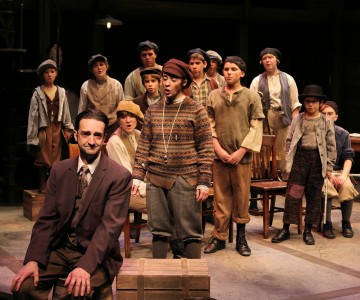


The History Theatre has premiered a new musical that uses a relatively obscure bit of history to illuminate a corner of the dynamic environment of Minneapolis in 1917, just as America was entering W.W. I. The show’s composer, the late Hiram Titus, had discovered an old photograph of a boys’ band and found it so inspiring that he began to write the music for a show about it. “The Working Boys Band,” with book and lyrics by Dominic Orlando, is the result of their collaboration.
The early 1900s are a period in our history rich with changes: factories had sprung up, and entrepreneurs were getting wealthy employing cheap child labor; cities were growing; patriotism had taken root and was blossoming.
The play is primarily about the harassment of music professor C. C. Heintzeman because he is a German. This is a legitimate topic, I suppose, but I felt set up for one story and was given another less interesting one.
Given the title, one might presume that this show is about the power of music to enrich the lives of “working boys in a band,” as publicity about the show also says. I wish it had been about that, and given audience reaction, I was not alone. In fact, the boys don’t play very much (although they do sing) and the lessons taught have more to do with “Manliness, Integrity, Intelligence, and Kindness,” which is one of the song titles. Did the boys ever learn to love music or was it a device to bring about behavior acceptable to the adults?
There was a big opening number, and the boys sang it, but it was about the boys working in the factory. It should have been about what the boys wanted and why they couldn’t have it. Playing in a band, then, either gives them what they want (someplace to go, some direction in their lives), or exactly what they don’t want (adults telling them what to do, just like in the factory.) It doesn’t even matter so much which it is, as long as it’s clear and makes sense with the characters we’re given. We didn’t know much about what the boys wanted; we only knew what the adults wanted for them.
The real snag in this production was that the idea, book, music and lyrics just didn’t match up. A prime example: was the patriotic zealot Mrs. T.G. Winter (Jen Burleigh-Bentz) a real threat or a comic villain? Dialog says she’s for real, but how are we to believe that Heintzeman has anything to fear when his nemesis launches into a soft-shoe comedy number called “Liberty Cabbage” in the middle of her verbal threats? If it’s so important to remove the professor as director of the band (not sure why she cares so much) why, then, does she take the whole play to do it? And how is it that a woman can wield this kind of power when she could not even vote at the time?
The whole nature of Heintzeman’s dilemma seemed so disingenuous that I longed for the story to wend its way back to the irresistible collection of unruly boys. What a charming mix of young actors, who could also sing and play an instrument! I wanted to know more about the boys and why they were working in a factory. What, I wondered, would motivate them after a long day of hard labor to come to a band rehearsal and be berated and demeaned? There was a reason (history shows this) but this play doesn’t seem very interested in it. We do eventually see the professor’s soft heart, but these scenes are unnecessarily contrived.
There is some pleasant musical material. Titus’ songs run from the boisterous “Just Make Sure You Get Home Alive,” which should have been about what the boys want; to the stirring “Nothing Like a Boy in Uniform,” which tells us that wearing a band uniform was the point, rather than making music; to the tender “Moonlight, Loring Park,” which is about the moon (June, soon, spoon) rather than the budding love story in front of us. In so many instances Titus’ music suggested one thing, and the lyric and story lead us elsewhere.
There were other puzzlements in both the book and lyrics. I’ll mention just two more. There is a minister’s son in the band who isn’t allowed to play music in church. This seemed odd for Minnesota, even that long ago. More to the point, a minister’s family was not wealthy, but they had enough stature in the community that I doubt very much that they would have sent their boy to work in a factory.
When at last we get to see the boys in uniform actually playing, a cheer erupted. But the boys quickly vanish from the stage (nearly audible sigh from the audience) and characters once again talk about the action, which is taking place somewhere else.
The cast assembled for this show, however, is flawless in so many respects. Jon Andrew Hegge as Heintzeman masterfully balances the disciplinarian in his character with a man who is learning to love again. It’s clear why the boys in the band (finally) come to care for him and why his assistant, Harriet Kent (Kendall Anne Thompson) does, too. Thompson is blessed with a crystal clear voice so effortlessly delivering the play’s most tender moments.
Burleigh-Bentz as the haughty Mrs. Winter is so skilled that with a more plausible story, she could certainly have made us believe it. She’s terrific, and I can’t wait to see her in another role.
Ricardo Vasquez as Franky nicely balanced his character’s transition from youth to adulthood. Christian Bardin as Andy deftly maneuvered a role that revealed important information much too late in the script.
In the end, we are left with the hope that lovers will be reunited, and the band will play on—but we still don’t know what becomes of those kids. “The Working Boys Band” plays through June 1.
Go to HowWasTheShow.com